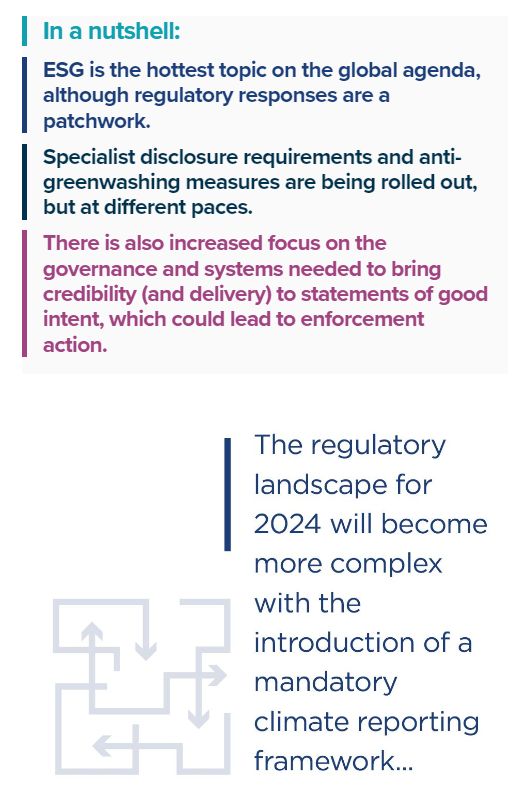Regulatory activity in various jurisdictions is hotting up, making it abundantly clear that, as with climate change, words are not enough

The EU
In 2024, the EU will plough ahead with upgrading its various disclosure requirements, requiring firms to do a lot of heavy lifting to implement changed and new rules. Among these are the Sustainable Finance Disclosure Regulation (SFDR); the Commission will conduct a post-implementation review of the SFDR and issue a report on its effectiveness due in Q2 2024.
Additionally, the Corporate Sustainability Reporting Directive (CSRD) starts its phased application in 2024; companies within the first phase will be preparing now for their first CSRD reports. However, following the adoption of the first set of European Sustainability Reporting Standards (ESRS), the Commission is rowing back on aspects of application of the directive, proposing to: delay the deadline for adoption of certain aspects of ESRS by two years, from June 2024 to June 2026; and reduce the number of companies caught by CSRD.
Aside from disclosures, the EU is also focusing on sustainability governance and transition planning through the Corporate Sustainability Due Diligence Directive (CSDDD). This is expected to be finalised in 2024. The CSDDD will require companies to adopt sustainable and responsible corporate behaviour and anchor human rights and environmental considerations in their operations, supply chain due diligence and corporate governance.
The UK
The UK is lagging the EU, although it is making progress. Over two years after sustainability disclosure standards and investment labels were first discussed, the new disclosure and labelling regimes for UK asset managers and distributors was finalised at the end of 2023 and will apply in phases from July 2024. Implementing the regime will be a major project for fund managers.
There will also be a new anti-greenwashing rule from May 2024 for all authorised firms. It is intended to apply the "fair, clear and not misleading" standard – familiar from the financial promotions regime – to sustainability statements. Firms will need to complete considerable work in very short order to integrate this new rule into their existing compliance frameworks, all while the Guidance is still being consulted on. Firms should also watch anti-greenwashing developments in the EU, with the European Supervisory Authorities due to publish reports in May 2024.
The FCA may look to enforce the new anti-greenwashing rule and the disclosure and labelling regimes as these become applicable during 2024. More broadly, the FCA said that it will embed ESG considerations across its functions, including enforcement, and it will continue to actively monitor how effectively firms and listed companies are implementing climate-related financial disclosures. It will be interesting to see if the FCA also turns its attention to governance as it looks to ensure firms back up the statements they make around ESG at a corporate level.
Other key areas to watch out for in 2024 in the UK are: the updating of the TCFD-aligned disclosure rules for listed companies to reference the new International Sustainability Standards Board reporting standards; ESG ratings providers coming within the regulatory perimeter; and the PRA's work to embed sustainability related risks in prudential assessments. As to a UK Green Taxonomy, it is still unclear whether it will emerge in 2024 even though the independent Green Technical Advisory Group, which advises the UK Government on the design and implementation, published its final advice in 2023.
Australia
In Australia, building credibility around sustainable finance is a key focus for the government, regulators and activists alike.
2023 saw ASIC commence its first civil penalty proceeding (followed by two further proceedings) alleging greenwashing misconduct on statements about the sustainable nature and characteristics of superannuation investment options. We also recently saw the government settle a claim brought by a government bondholder in relation to climate risk disclosures, and another shareholder application for documents against one of Australia's largest banks to test allegations that it failed to manage risks relating to climate change and biodiversity loss.
The regulatory landscape for 2024 will become more complex with the introduction of a mandatory climate reporting framework, which will commence for larger corporates and financial institutions on 1 July. ASIC has also indicated that greenwashing will remain an enforcement priority in 2024, with potential for future greenwashing cases to move beyond allegations of misleading and deceptive conduct into licence obligations, directors' and officers' duties and a range of other obligations. Litigation brought by environmental groups will continue to be a feature of the landscape.
The US
In the US, the SEC's proposed climate risk disclosure rule, first proposed in March 2022, remains just that. It was originally expected to be finalised early in 2023 but has stalled and is expected to be the subject of litigation if and when it becomes law. The rule would require listed companies to include data on greenhouse gas emissions and other climate risks in regulatory filings. At least one state, California, recently enacted its own laws governing how companies doing business there report climate risks. Both the SEC's proposed rule and California's recently enacted ones are likely to be the subjects of continuing debate and, potentially, litigation in the coming year.
The SEC separately has pursued ESG-related litigation through its Climate and ESG Task Force and this is likely to continue in the coming year. Recent cases have highlighted that typically, at the root of an ESG-related action, are either misstatements or "false and misleading statements" which have the potential to undermine investment decision-making. Enforcement actions taken by the SEC underscore that firms need to take particular care about their ESG claims and disclosures even without a specific rule mandating that they do so.
Recent media reports also indicate that the SEC served ESG-related subpoenas on various investment advisers last year as part of an investigation we expect to learn more about in 2024.
A patchwork with a pattern
Although a patchwork, the requirement for much greater transparency on how boards set ESG strategy and targets, and how they oversee ESG requirements, will be a common theme. That's certainly true in the EU and UK. Vague statements about the role of the board will not be good enough. That increased transparency will require not only more board time and attention but also changes to the way ESG issues are highlighted and documented in board papers, including the reasons for decision-making.
A wider group of stakeholders has been identified as relevant to boards' considerations, but we can expect non-governmental organisations and others to make use of the greater transparency to bring greater scrutiny, make greater demands of regulators to hold companies to account and make greater use of the courts to seek redress.
The content of this article is intended to provide a general guide to the subject matter. Specialist advice should be sought about your specific circumstances.








